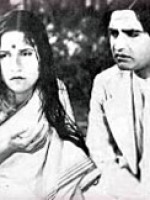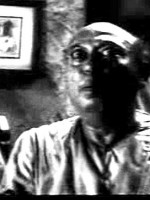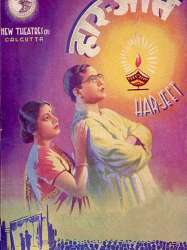Kanan Devi est une Actrice et Producteur Indienne née le 22 avril 1916 à Howrah (Inde)
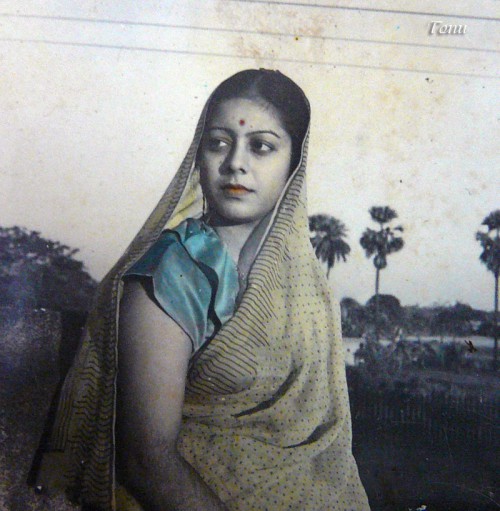
Kanan Devi (en bengali : কানন দেবী), née à Howrah (présidence du Bengale, Indes britanniques) le 22 avril 1916 et morte à Calcutta le 17 juillet 1992, est une actrice et chanteuse indienne.
Elle est du nombre des meilleures chanteuses étoiles du cinéma indien et est aussi créditée populairement comme étant la première étoile du cinéma bengali. Son style de chant, habituellement au tempo rapide, est instrumentalisé dans quelques-uns des plus grands succès des studios New Theatres à Calcutta.
A well wisher Tulsi Banerji whom she called Kaka babu introduced Kanan when she was only ten to Madan Theatres/Jyoti Studios where she was cast in a small role in Jaidev (1926), followed by Shankaracharya in 1927. She was known as Kanan Bala.
Kanan did at least five films with Madan Theatres productions, (1926-1932) Rishir Prem (1931), Jorebarat (1931), Vishnu Maya (1932) and Prahlad, playing even male leads in the last two.
She then worked with Radha Films from 1933 to 1936, then with New Theatres from 1937-1941, with MP Productions 1942-1948 and finally set up her own label Shrimati Pictures 1949-1965.
From silent film roles as a child artist Kanan made the successful transition into talkie films and was noticed with Jorebarat (1931), Manomoyee Girls School, Khooni Kaun and Maa (1934).
Her films with Jyotish Banerjee included Joydev (1926), Rishir Prem (1931), Jorebarat (1931), Vishnumaya (1932), Kantahaar (1935) and Manomoyee Girls School (1935). Her films with Prafulla Ghosh were Sree Gouranga (1933), Char Darvesh (1933), Maa (1934) and Hari Bhakti. Others with Radha Film Company were Kanthahar (1935), Krishna Sudama (1936), Bishabriksha (1936) and Char Darvesh (1933).
New Theatres's P.C. Barua wanted her to play the lead in his Devdas (1935), but, due to contractual reasons with Radha, she could not act in the film, a factor she regretted all her life.
The films of New Theatres owned by Biren Sircar established her as a superhit singer and her films ran to packed audiences. She had to travel under constant protection given her huge fan following. During her years with New Theatres, Calcutta from 1937, she played the lead in Barua's Mukti (1937), which was perhaps her finest performance, making her the studio's top star. Apart from Mukti, she did Vidyapati, Saathi (1938), Street Singer (1938), Sapera (1939), Jawani Ki Reet (1939), Parajay (1939), Abhinetri (1940), Lagan (1941), Parichay (1941) and Jawab (1942). She became known as Kanan Devi from this point.
She came in contact with the music maestro Rai Chand Boral who not only coached and familiarized her in the Hindi accent but experimented with many classical Western and Indian forms in his music. She received her initial musical training under Alla Rakha. She was employed as a singer at the Megaphone Gramaphone Company, receiving further training under Bhishmadev Chatterjee. She later learnt Rabindra Sangeet under Anadi Dastidar. Kanan remained the top star of New Theatres until she resigned her contract in 1941 and began to freelance in Bengali and Hindi films.
She worked with the biggest names in Indian cinema from K. L. Saigal, Pankaj Mullick, Pramathesh Barua, Pahari Sanyal, Chabi Biswas and Ashok Kumar.
M.P. Productions's Jawaab, was perhaps her biggest hit. Her song Duniya Yeh Duniya, Hai Toofan Mail was well received. She repeated the same feast in Hospital (1943), Banphool (1945), and Rajlakshmi (1946). Kanan Devi's last Hindi film was Chandrashekhar (1948) with Ashok Kumar.
Kanan turned producer with Shrimati Pictures in 1949 and later launched the Sabyasachi Collective with the film Ananya (1949). Her own productions were mainly based on the stories of Sharat Chandra Chattopadhyay.
Kanan married Ashok Maitra in December 1940. He was the son of the staunch Brahmo Samaj educationist Heramba Chandra Maitra. Despite their best intentions, the marriage could not withstand the severe condemnation by the then conservative society. Even the poet Rabindra Nath Tagore who sent a token gift to the married couple received scathing criticism for blessing the couple. The main issue was Kanan was not expected to be working in films after her marriage. She filed for divorce in 1945. Despite the pain of the divorce, Kanan expressed her immense gratitude towards her first husband for giving her social recognition through marriage for the first time in her life. To Kanan's credit she maintained excellent relations with Rani Mahanalobis, sister to Ashok Maitra and her husband the famous social scientist P.C. Mahanalobis and with Kusumkumari Devi, Ashok Maitra's mother, even after the marriage was severed.
Kanan married Haridas Bhattacharjee around 1949. Haridas Bhattacharjee was then ADC to the Governor of Bengal. He eventually left the naval service to join Kanan in her filmmaking venture and became a competent director. While raising their son Siddharth in Calcutta, she also formed and worked as the president of Mahila Shilpi Mahal, an organization to help senior female artists and other charitable and community causes including those for the upliftment of Bengali cinema.
Kanan Devi, as the first lady of the Bengali screen, received many honours for her contribution to Indian cinema. An honorary degree from Vishwabharati, the Padma Shree in 1968 and the Dadasaheb Phalke Award in 1976.
She died on 17 July 1992 in Belle View Clinic, Calcutta when she was around seventy-six years of age.
Source : Wikidata
Kanan Devi

Nationalité Inde
Naissance 22 avril 1916 à Howrah (Inde)
Mort 17 juillet 1992 (à 76 ans) à Calcutta (Inde)
Récompenses Prix Dadasaheb Phalke
Naissance 22 avril 1916 à Howrah (Inde)
Mort 17 juillet 1992 (à 76 ans) à Calcutta (Inde)
Récompenses Prix Dadasaheb Phalke
Elle est du nombre des meilleures chanteuses étoiles du cinéma indien et est aussi créditée populairement comme étant la première étoile du cinéma bengali. Son style de chant, habituellement au tempo rapide, est instrumentalisé dans quelques-uns des plus grands succès des studios New Theatres à Calcutta.
Biographie
Kanan was born on 22 April 1916 in Howrah, West Bengal. In her autobiography, entitled "Sabaray Ami Nami", Kanan has observed that those she considered as her parents Ratan Chandra Das and Rajobala lived together. After the death of her adoptive father, Ratan Chandra Das, young Kanan and Rajobala were simply left to fend for themselves. Her life story is a true tale of rags to riches. Some say she did her schooling (not completed) from Howrah's St. Agnes' Convent School,A well wisher Tulsi Banerji whom she called Kaka babu introduced Kanan when she was only ten to Madan Theatres/Jyoti Studios where she was cast in a small role in Jaidev (1926), followed by Shankaracharya in 1927. She was known as Kanan Bala.
Kanan did at least five films with Madan Theatres productions, (1926-1932) Rishir Prem (1931), Jorebarat (1931), Vishnu Maya (1932) and Prahlad, playing even male leads in the last two.
She then worked with Radha Films from 1933 to 1936, then with New Theatres from 1937-1941, with MP Productions 1942-1948 and finally set up her own label Shrimati Pictures 1949-1965.
From silent film roles as a child artist Kanan made the successful transition into talkie films and was noticed with Jorebarat (1931), Manomoyee Girls School, Khooni Kaun and Maa (1934).
Her films with Jyotish Banerjee included Joydev (1926), Rishir Prem (1931), Jorebarat (1931), Vishnumaya (1932), Kantahaar (1935) and Manomoyee Girls School (1935). Her films with Prafulla Ghosh were Sree Gouranga (1933), Char Darvesh (1933), Maa (1934) and Hari Bhakti. Others with Radha Film Company were Kanthahar (1935), Krishna Sudama (1936), Bishabriksha (1936) and Char Darvesh (1933).
New Theatres's P.C. Barua wanted her to play the lead in his Devdas (1935), but, due to contractual reasons with Radha, she could not act in the film, a factor she regretted all her life.
The films of New Theatres owned by Biren Sircar established her as a superhit singer and her films ran to packed audiences. She had to travel under constant protection given her huge fan following. During her years with New Theatres, Calcutta from 1937, she played the lead in Barua's Mukti (1937), which was perhaps her finest performance, making her the studio's top star. Apart from Mukti, she did Vidyapati, Saathi (1938), Street Singer (1938), Sapera (1939), Jawani Ki Reet (1939), Parajay (1939), Abhinetri (1940), Lagan (1941), Parichay (1941) and Jawab (1942). She became known as Kanan Devi from this point.
She came in contact with the music maestro Rai Chand Boral who not only coached and familiarized her in the Hindi accent but experimented with many classical Western and Indian forms in his music. She received her initial musical training under Alla Rakha. She was employed as a singer at the Megaphone Gramaphone Company, receiving further training under Bhishmadev Chatterjee. She later learnt Rabindra Sangeet under Anadi Dastidar. Kanan remained the top star of New Theatres until she resigned her contract in 1941 and began to freelance in Bengali and Hindi films.
She worked with the biggest names in Indian cinema from K. L. Saigal, Pankaj Mullick, Pramathesh Barua, Pahari Sanyal, Chabi Biswas and Ashok Kumar.
M.P. Productions's Jawaab, was perhaps her biggest hit. Her song Duniya Yeh Duniya, Hai Toofan Mail was well received. She repeated the same feast in Hospital (1943), Banphool (1945), and Rajlakshmi (1946). Kanan Devi's last Hindi film was Chandrashekhar (1948) with Ashok Kumar.
Kanan turned producer with Shrimati Pictures in 1949 and later launched the Sabyasachi Collective with the film Ananya (1949). Her own productions were mainly based on the stories of Sharat Chandra Chattopadhyay.
Kanan married Ashok Maitra in December 1940. He was the son of the staunch Brahmo Samaj educationist Heramba Chandra Maitra. Despite their best intentions, the marriage could not withstand the severe condemnation by the then conservative society. Even the poet Rabindra Nath Tagore who sent a token gift to the married couple received scathing criticism for blessing the couple. The main issue was Kanan was not expected to be working in films after her marriage. She filed for divorce in 1945. Despite the pain of the divorce, Kanan expressed her immense gratitude towards her first husband for giving her social recognition through marriage for the first time in her life. To Kanan's credit she maintained excellent relations with Rani Mahanalobis, sister to Ashok Maitra and her husband the famous social scientist P.C. Mahanalobis and with Kusumkumari Devi, Ashok Maitra's mother, even after the marriage was severed.
Kanan married Haridas Bhattacharjee around 1949. Haridas Bhattacharjee was then ADC to the Governor of Bengal. He eventually left the naval service to join Kanan in her filmmaking venture and became a competent director. While raising their son Siddharth in Calcutta, she also formed and worked as the president of Mahila Shilpi Mahal, an organization to help senior female artists and other charitable and community causes including those for the upliftment of Bengali cinema.
Kanan Devi, as the first lady of the Bengali screen, received many honours for her contribution to Indian cinema. An honorary degree from Vishwabharati, the Padma Shree in 1968 and the Dadasaheb Phalke Award in 1976.
She died on 17 July 1992 in Belle View Clinic, Calcutta when she was around seventy-six years of age.
Le plus souvent avec
Filmographie de Kanan Devi (11 films)
Actrice

মেজদিদি (1950)
Réalisé par Ajoy Kar
Genres Drame
Acteurs Tulsi Chakraborty, Kanan Devi, Shobha Sen
Rôle Hemangini

Jawab (1942)
Réalisé par P.C. Barua
Genres Drame, Comédie
Acteurs P.C. Barua, Kanan Devi, Jamuna, Tulsi Chakraborty
Rôle Meena

Lagan (1941)
Réalisé par Nitin Bose
Acteurs Kundan Lal Saigal, Kanan Devi
Rôle Kusum Kumari
At the annual college event the main singer goes missing. To help matters, Kusum Kumari (Kanan Devi) plays a record. The lyrics of the song are by a young poet (K. L. Saigal) living in a village. The Principal of the college, impressed by the poet’s work brings him to the city. The poet takes to training Kusum to sing for the next event and falls in love with her. One of the patrons (Nawab) is a wealthy businessman. He is enthralled by Kusum and after negotiations with her father, gets married to her in spite of the poet trying to intercede. The poet disappears but after some time the husband listens to Kusum and helps in furthering the poet’s career. The gesture is misunderstood by the poet who thinks that the help was given to him because of Kusum’s love for him. Finally Kusum has to let him know that for her the poet was a Guru she respected.
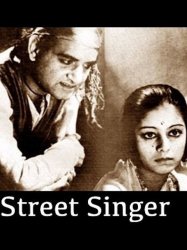
Street Singer (1938)
, 2h15Réalisé par Phani Majumdar
Genres Drame
Acteurs Kundan Lal Saigal, Kanan Devi
Bhulwa helps Manju escape from a burning orphanage and from the care of the tyrannical manager of the orphanage. The two street urchins go from village to village, singing and making money. Bhulwa’s big dream is to someday sing in a theatre in Calcutta. Several years later both are singing on the streets in Calcutta and Manju (Kanan Devi) is employed by a theatre to sing. Bhulwa (K. L. Saigal) encourages her through her nervousness and she becomes a popular singer. However her attitude towards servants and other people changes and Bhulwa is disappointed and tells her off. Bhulwa is still struggling but manages to get a chance to sing on the radio. Manju comes to know of his singing assignment when she listens to him sing on the radio. Feeling slighted she decides to sing Bhulwa’s song in a new style, the way the actor-manager Kailash wants. She leaves a message with the servant asking him to send Bhulwa to the theatre. Bhulwa gets drenched in the rain and is feverish but he goes to listen to Manju. On hearing the new tune given to his favourite song he gets aggressive on the stage and then leaves from there. Manju by now is repentant and decides to search for him. She asks the manager-actor Kailash to drive her and searches the roads by which both had travelled to come to the city. She spies Bhulwa in a boat which is being tossed around due to the wind and storm. The boat crashes against the banks. Manju rushes to Bhulwa and cradles his head on her lap. Kailash leaves them, while both look towards the road leading to the village.
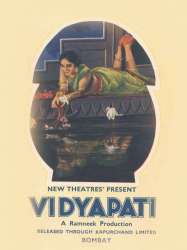
Bidyapati (1937)
, 2h21Genres Drame, Romance
Acteurs Pahari Sanyal, Kanan Devi, Chhaya Devi, Prithviraj Kapoor, Krishna Chandra Dey
Rôle Anuradha
Note69%





King Shiva Singha (Prithviraj Kapoor) and His queen Lakshmi (Chhaya Devi) invite the poet Vidyapati (Pahari Sanyal) to their palace. He arrives with his constant companion Anuradha (Kanan Devi). The queen finds herself getting attracted to Vidyapati’s poetry and falls in love with him. This causes great anguish to the king who in his distress abandons his responsibilities and turns to Anuradha. The troubled Queen decides to kill herself and when the Prime Minister gets to hear of it he encourages her as he feels that Vidyapati’s sensuous bold poetry has had a detrimental effect on the king. The king in the end sends for his queen through Anuradha. Standing near the statue of Shiva, the king and queen consume poison.
Production

মেজদিদি (1950)
Réalisé par Ajoy Kar
Genres Drame
Acteurs Tulsi Chakraborty, Kanan Devi, Shobha Sen
Rôle Producteur
 Connexion
Connexion
